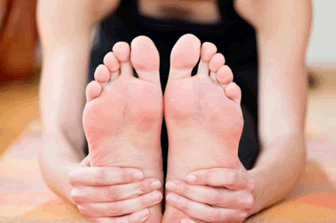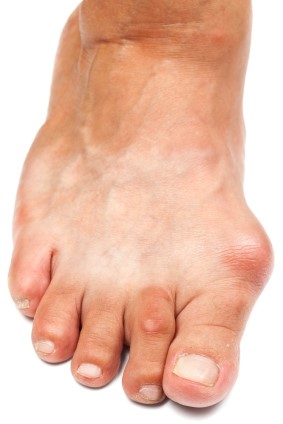





 If you’re waking in the mornings with pain in your feet, it may be because you have plantar fasciitis. Plantar fasciitis is described as heel pain that occurs as a result of inflammation and injury of the plantar fascia, which stretches along the bottom of our feet’s soles. Our plantar fascias are “prone to overuse injuries,” and symptoms of the condition include “morning stiffness, stiffness after working out, and pain while walking barefoot.” Treating your plantar fasciitis involves investing in custom orthotics, changing your footwear, anti-inflammatory medication, splints and physical therapy.
If you’re waking in the mornings with pain in your feet, it may be because you have plantar fasciitis. Plantar fasciitis is described as heel pain that occurs as a result of inflammation and injury of the plantar fascia, which stretches along the bottom of our feet’s soles. Our plantar fascias are “prone to overuse injuries,” and symptoms of the condition include “morning stiffness, stiffness after working out, and pain while walking barefoot.” Treating your plantar fasciitis involves investing in custom orthotics, changing your footwear, anti-inflammatory medication, splints and physical therapy.
Plantar fasciitis can be very painful and inconvenient. If you are experiencing heel pain or symptoms of plantar fasciitis, contact one of our podiatrists of Active Foot and Ankle Care, LLC. Our doctors can provide the care you need to keep your pain free and on your feet.
What is Plantar Fasciitis?
Plantar fasciitis is the inflammation of the thick band of tissue that runs along the bottom of your foot, known as the plantar fascia, and causes mild to severe heel pain.
What Causes Plantar Fasciitis?
· Excessive running
· Non-supportive shoes
· Overpronation
· Repeated stretching and tearing of the plantar fascia
How Can It Be Treated?
· Conservative measures – anti-inflammatories, ice packs, stretching exercises, physical therapy, orthotic devices
· Shockwave therapy – sound waves are sent to the affected area to facilitate healing and are usually used for chronic cases of plantar fasciitis
· Surgery – usually only used as a last resort when all else fails. The plantar fascia can be surgically detached from the heel
While very treatable, plantar fasciitis is definitely not something that should be ignored. Especially in severe cases, speaking to your doctor right away is highly recommended to avoid complications and severe heel pain. Your podiatrist can work with you to provide the appropriate treatment options tailored to your condition.
If you have any questions please feel free to contact our offices located in New Jersey. We offer the newest diagnostic tools and technologies to treat your foot and ankle needs.
 As we age, our feet wear down over time, as “our body absorbs two to three times their weight due to gravity.” According to podiatrist Dr. Joy Rowland, our feet gradually become longer and wider, our ligaments and tendons become “a little bit more lax over time,” and our feet can develop foot deformities such as hammertoe. We also begin losing the fat pad that supports our feet as we age, so it’s important to change your shoes often as your feet change too.
As we age, our feet wear down over time, as “our body absorbs two to three times their weight due to gravity.” According to podiatrist Dr. Joy Rowland, our feet gradually become longer and wider, our ligaments and tendons become “a little bit more lax over time,” and our feet can develop foot deformities such as hammertoe. We also begin losing the fat pad that supports our feet as we age, so it’s important to change your shoes often as your feet change too.
Proper foot care is something many older adults forget to consider. If you have any concerns about your feet and ankles contactone of our podiatrists of Active Foot and Ankle Care, LLC. Our doctors can provide the care you need to keep your pain free and on your feet.
The Elderly and their Feet
As we age we start to notice many changes in our body, but the elder population may not notice them right away. Medical conditions may prevent the elderly to take notice of their foot health right away. Poor vision is a lead contributor to not taking action for the elderly.
Common Conditions
Neuropathy – can reduce feeling in the feet, and can hide many life threating medical conditions.
Reduced flexibility – prevents the ability of proper toenail trimming, and foot cleaning. If left untreated, it may lead to further medical issues.
Foot sores – amongst the older population can be serious before they are discovered. Some of the problematic conditions they may face are:
Gouging toenails affecting nearby toe
Shoes that don’t fit properly
Pressure sores
Loss of circulation in legs & feet
Edema & swelling of feet and ankles
Susceptible Infections
Diabetes and poor circulation can cause general loss of sensitivity over the years, turning a simple cut into a serious issue.
If you have any questions please feel free to contact our offices located in New Jersey. We offer the newest diagnostic tools and technologies to treat your foot and ankle needs.
 Bunions are characterized as unsightly bumps that run along the side of your big toe, potentially leading to irritation and pain as we walk or run. Preventing bunions is as simple as finding footwear that gives your feet enough room to move and doesn’t push your toes together. Conditions such as “low arches, flat feet, and loose joints and tendons” make your feet more prone to bunions. Treating your bunions involves accommodating your feet by wearing comfortable shoes that are wide as well as seeing your podiatrist to find proper treatment.
Bunions are characterized as unsightly bumps that run along the side of your big toe, potentially leading to irritation and pain as we walk or run. Preventing bunions is as simple as finding footwear that gives your feet enough room to move and doesn’t push your toes together. Conditions such as “low arches, flat feet, and loose joints and tendons” make your feet more prone to bunions. Treating your bunions involves accommodating your feet by wearing comfortable shoes that are wide as well as seeing your podiatrist to find proper treatment.
Bunion surgery usually occurs after non-surgical methods have proved to be ineffective. If you have any concerns, contact one of our podiatrists of Active Foot and Ankle Care, LLC. Our doctors can provide the care you need to keep your pain free and on your feet.
What is a Bunion?
A bunion is formed of swollen tissue or an enlargement of boney growth, usually located at the base joint of the toe that connects to the foot. The swelling occurs by the bones in the big toe shifting inward, which impacts the other toes of the foot. This causes the area around the base of the big toe to become inflamed and painful.
Why do Bunions Form?
How are Bunions Diagnosed?
Doctors often perform two tests – blood tests and x-rays – when trying to diagnose bunions, especially in the early stages of development. Blood tests help determine if the foot pain is being caused by something else, such as arthritis, while x-rays provide a clear picture of your bone structure to your doctor.
How are Bunions Treated?
If you have any questions please feel free to contact our offices located in New Jersey. We offer the newest diagnostic tools and technologies to treat your foot and ankle needs.
 Bacteria thrives in moist, public places such as gyms, and can lead to infections such as plantar warts. To avoid contracting contagious infections like plantar warts, take precautions when using public gym equipment. Clean any gym equipment you plan on using, and cover up any open wounds. Wear flip flops in the locker rooms and public shower areas. Also bring your own gym equipment.
Bacteria thrives in moist, public places such as gyms, and can lead to infections such as plantar warts. To avoid contracting contagious infections like plantar warts, take precautions when using public gym equipment. Clean any gym equipment you plan on using, and cover up any open wounds. Wear flip flops in the locker rooms and public shower areas. Also bring your own gym equipment.
Plantar warts can be very uncomfortable. If you need your feet checked, contact one of our podiatrists of Active Foot and Ankle Care, LLC. Our doctors can provide the care you need to keep your pain free and on your feet.
About Plantar Warts
Plantar warts are the result of HPV, or human papillomavirus, getting into open wounds on the feet. They are mostly found on the heels or balls of the feet.
While plantar warts are generally harmless, those experiencing excessive pain or those suffering from diabetes or a compromised immune system require immediate medical care. Plantar warts are easily diagnosed, usually through scraping off a bit of rough skin or by getting a biopsy.
Symptoms
Treatment
To help prevent developing plantar warts, avoid walking barefoot over abrasive surfaces that can cause cuts or wounds for HPV to get into. Avoiding direct contact with other warts, as well as not picking or rubbing existing warts, will help prevent the further spread of plantar warts. However, if you think you have developed plantar warts, speak to your podiatrist. He or she can diagnose the warts on your feet and recommend the appropriate treatment options.
If you have any questions please feel free to contact our offices located in New Jersey. We offer the newest diagnostic tools and technologies to treat your foot and ankle needs.






